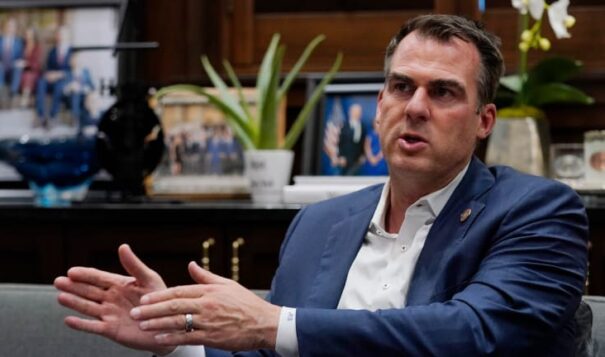News Based on facts, either observed and verified directly by the reporter, or reported and verified from knowledgeable sources.
Oklahoma governor stripped of power over Native council
 Oklahoma Gov. Kevin Stitt is pictured during an interview in his office Wednesday, Aug. 3, 2022, in Oklahoma City. The Oklahoma Board of Pardon and Parole has recommended clemency for death row inmate James Coddington. Stitt said that he hasn't been formally briefed on Coddington's case, but that with any clemency recommendation, he meets with prosecutors, defense attorneys and the victim's family before making a decision. (AP Photo, Sue Ogrocki)
Oklahoma Gov. Kevin Stitt is pictured during an interview in his office Wednesday, Aug. 3, 2022, in Oklahoma City. The Oklahoma Board of Pardon and Parole has recommended clemency for death row inmate James Coddington. Stitt said that he hasn't been formally briefed on Coddington's case, but that with any clemency recommendation, he meets with prosecutors, defense attorneys and the victim's family before making a decision. (AP Photo, Sue Ogrocki)
At odds with the tribes, Stitt can only make one appointment to the Native education council
Oklahoma lawmakers curtailed Gov. Kevin Stitt’s influence over a board devoted to Native American education as the state’s chief executive continues to feud with tribal leaders.
Lawmakers stripped Stitt of eight of his nine appointments to the Oklahoma Advisory Council on Indian Education — a lesser-known state board that could play a key role in crafting new public school curricula on Native American issues, a priority for state Superintendent Ryan Walters.
Lawmakers overwhelmingly passed Senate Bill 299 this year to continue the advisory council until 2026. The measure also reduced the number of Stitt appointees on the panel. It was one of several bills introduced to limit the governor’s power over various state boards and commissions.
Tribal leaders, who requested the legislation, said Stitt left vacancies on the council for years and refused to act despite tribes submitting potential nominees.
“The tribes felt like their voices were not being heard on the board,” Sen. Roger Thompson, the bill’s author, told the Oklahoma Voice.
Thompson, R-Okemah, also noted Stitt’s combative record on tribal relations since he unsuccessfully tried to renegotiate the state’s gaming compacts — a dispute that spurred years of litigation and resentment between the governor and major tribal nations on compacting and sovereignty issues.
Stitt initially vetoed SB 299, but the Oklahoma Legislature overturned it, and the new law took effect July 1.
The council is expected to resume meeting this fall after House Speaker Charles McCall, R-Atoka, and Senate Pro Tem Greg Treat, R-Oklahoma City, make new appointments to the board following recommendations submitted by tribal leaders. The council includes representatives from tribal nations and colleges, the State Department of Education, and the Oklahoma State Regents for Higher Education.
Stitt said he vetoed the bill extending the council in an attempt to shrink the size of state government. The council “does not at this time serve a necessary government function,” Stitt wrote in his veto message.
Stitt’s office declined to comment further.
But tribal representatives say the council is crucial to helping K-12 schools across the state meet the needs of more than 150,000 Native American students.
In addition to weighing in on curricula, the council helps direct resources to Native American students, said Cherokee Nation Principal Chief Chuck Hoskin Jr.
It also “helps make sure lessons on Native American history and culture are accurate and Native American students are treated in culturally-appropriate ways,” he said in a statement.
Stitt appointed five people to the council in February 2022. But there were, at times, up to eight vacancies on the board, which made it difficult to have the minimum number of members for the panel to meet, said former council Chairwoman Lucyann Harjo.
“That really impacts our discussions and how we continue to advocate for Indian children, as well as the collaboration and communication between schools and the state of Oklahoma and tribal nations,” she said.
The council makes recommendations to the State Board of Education on professional development for teachers and lesson plans on tribal issues, and addresses concerns from Native American communities, Harjo said.
A Native education coordinator at Norman Public Schools, Harjo has served on the council since it was formed in 2011.
The council has previously discussed how school officials should handle Native American boys being bullied for wearing braids and students wearing tribal regalia during graduation ceremonies, which spurred a new state law.
Harjo said she’s hopeful shifting many council appointments from Stitt to legislative leaders will make the process seamless and prevent long-term vacancies.
“I just want to thank the state Legislature for seeing the importance of it, the value of it,” she said, “so that we can continue to push forward working with the state closely to address the educational needs of our kids in our schools.”
Walters, the state superintendent, said the council will undoubtedly play a role as he seeks to make lessons crafted by the tribes available to teachers across the state.
A former high school history teacher in McAlester, Walters said he previously helped the Chickasaw Nation write its history curricula, which he praised as among the most thorough in the state.
More recently, Walters said he has reached out to other Oklahoma tribes to learn about their lesson plans and how they teach their history. Now, he wants to align lessons from tribes with state academic standards so they’re easily accessible for all public schools.
“We should have the most robust tribal curriculum for every district in the state to be able to offer,” Walters said.
This article was first published in the Oklahoma Voice.
Dateline:
OKLAHOMA CITY
